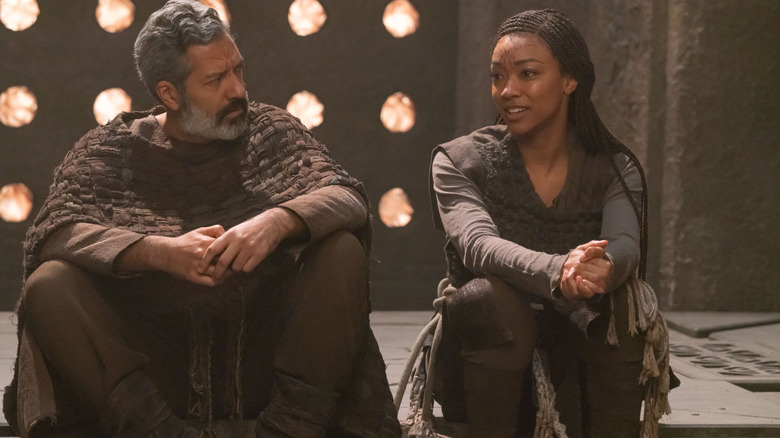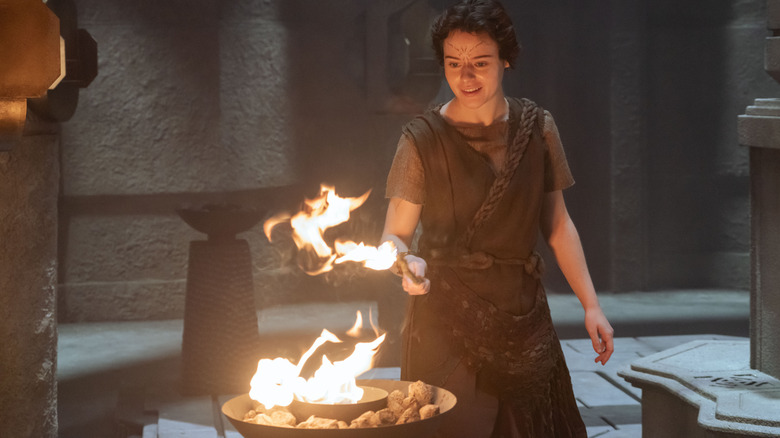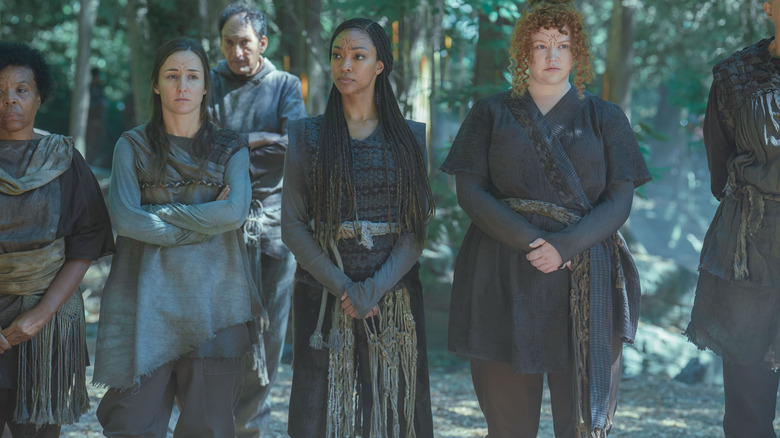Discovery Added A New Wrinkle To Star Trek's Biggest Moral Dilemma
Black alert! This article discusses spoilers for the latest episode of "Star Trek: Discovery."
There are two undeniable givens in the "Star Trek" universe: all Starfleet captains must accept the inevitability of encountering a no-win situation (aka the Kobayashi Maru test), and you never, ever violate General Order 1, aka the Prime Directive. While both are entrenched parts of franchise lore, the latter has always added a unique moral dilemma that transcends each captain and crew. For the technologically advanced societies that make up the backbone of the United Federation of Planets, there's nothing more detrimental than meddling with the development and evolution of pre-warp civilizations. ("Voyager" took this to even greater lengths with the introduction of the Temporal Prime Directive, which added a time-travel component to the usual doctrine of noninterference.) Despite expectations for officers to treat this directive with the utmost seriousness, however, time and again "Trek" writers have sought to bend and even break the property's most unbreakable rule.
This week, "Star Trek: Discovery" all but jumped at the chance to completely upend established tradition in episode 6, titled "Whistlespeak." While following the breadcrumbs that will eventually lead the USS Discovery to the Progenitors' technology, Michael Burnham (Sonequa Martin-Green) and Tilly (Mary Wiseman) make their way to a more primitive planet perpetually at risk of destruction due to extreme weather patterns. What the inhabitants don't realize, however, is that their religious pilgrimage to the sacred "High Summit" (in actuality, one of several weather-monitoring stations discreetly planted by the Progenitors and the location of the next clue) has been infiltrated by a pair of benevolent aliens seeking a way inside. Tasked with accomplishing their mission without giving away their true identities, Burnham and Tilly soon confront the limits of the Prime Directive — and make a surprising choice.
In Discovery, the ends (sometimes) justify the means
Although it's not exactly novel for "Star Trek" characters to take the constraints of the Prime Directive and throw them out the window when circumstances call for it (the legendary James T. Kirk practically turned this into his own personal hobby throughout "The Original Series"), "Discovery" takes an even more interesting route on its way to a familiar destination. Rather than a Captain contorting themselves to come up with a different interpretation of the general order or search high and low for a convenient loophole, the typically impulsive Burnham makes another choice entirely. She simply takes responsibility for intentionally violating the biggest rule in Starfleet and accepts the consequences that may fall her way. In other words, she owns it.
The impetus for this brazen act comes from the fact that, naturally, lives are at stake. While Tilly respectfully adheres to the customs of the indigenous people to gain access to the weather station (which involves a punishing race through an arid environment without the benefit of water), Burnham and her Discovery crew hidden in orbit work on a way to beam the Captain inside. What the two outsiders don't fully grasp until it's too late, however, is the disturbing twist that Tilly and her new friend Ravah (June Laporte) have actually volunteered to sacrifice themselves to the gods. Facing the impossible choice of letting them die needlessly versus exposing themselves to less-developed beings, Burnham disregards the concerns of the prickly Commander Rayner (Callum Keith Rennie) and reveals the truth to Ravah's devout father, Ohvahz (Alfredo Narciso).
In the process, the episode firmly — and perhaps controversially — comes out in favor of the idea that the ends (saving lives) fully justify the means (breaking Starfleet's most sacred rule).
Will Burnham face consequences?
Compared to countless instances in "Star Trek" past where characters in similar predicaments have made essentially the exact same call that Burnham does, it's fair to ask why this development in "Whistlespeak" should feel especially audacious. Previously, characters flagrantly breaking protocol regarding the Prime Directive typically came prepared with a logical justification or by pointing out some arbitrary ambiguity in the letter of the law that allowed them to skate by on, essentially, technicalities. The writers in this latest episode of "Discovery" don't even try to come up with a similar convenience, however, perhaps implicitly acknowledging the creative idea that rules are meant to be broken in order to maximize drama and, as a result, adding a fascinating new wrinkle to the franchise's longstanding tradition.
Namely, viewers are left wondering whether Burnham will face actual consequences for defying Starfleet protocol. For a series that began with our main hero coming under fire for staging a mutiny against Discovery's then-Captain Philippa Georgiou (Michelle Yeoh), wouldn't there be a fitting sense of poetry in having the final season once again hold Burnham accountable for her (arguably) reckless actions? Admittedly, the episode nods towards this possibility in dialogue near the end, but this wouldn't be the first time "Trek" breezed past the messiness of its own characters for the sake of moving things along and tacitly endorsed their actions by, well, ignoring that they ever happened in the first place. As serialized as this series in particular has always been, not a single Trekkie would be surprised to tune in next week and discover that Burnham only received an off-screen slap on the wrist, at most. Episode 7 now has a prime opportunity to do something different.
New episodes of "Star Trek: Discovery" stream on Paramount+ every Thursday.


